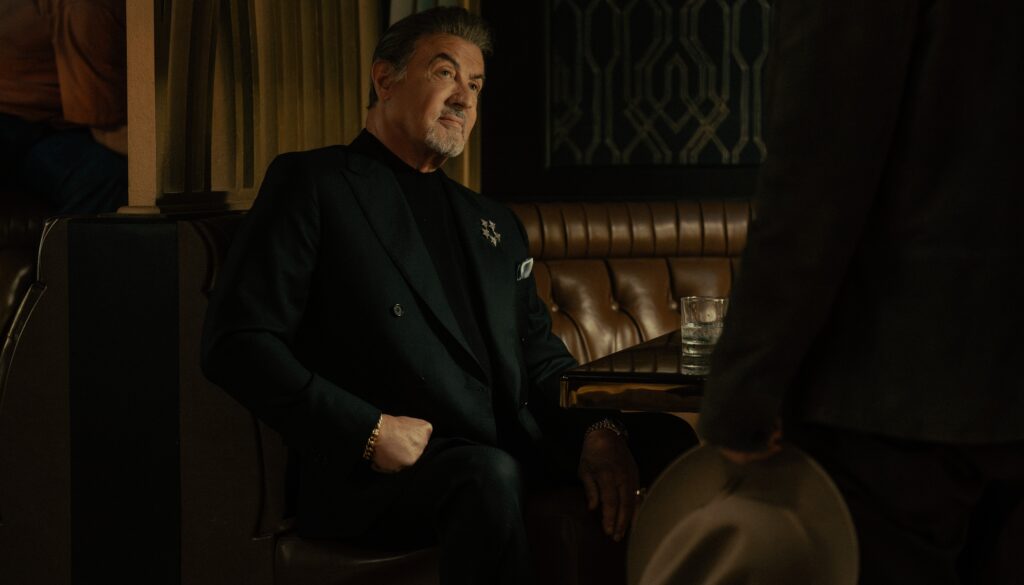TL;DR: Dwight versus Dunmire is the showdown we didn’t know we needed. Episode 2 sets the table for a season that promises blood, bourbon, and betrayal. Stallone’s still got it, Robert Patrick steals the show, and the only certainty is carnage.
Tulsa King Season 3
There are TV episodes that just move the plot forward, and then there are TV episodes that rearrange the chessboard so completely that you can almost hear the writers cackling in the background. Tulsa King Season 3, Episode 2 is absolutely the latter. It’s the kind of hour where you feel the ground shifting beneath your feet, the weight of all the violent inevitabilities settling on your chest, and you know—absolutely know—that this isn’t going to end with a handshake and a truce. This is Stallone’s mob saga tightening the noose and reminding us that when Dwight Manfredi makes enemies, they tend to be biblical in scale.
Now, I’ve been watching Tulsa King since the pilot, and I’ll be honest: I wasn’t sure if the show was going to have legs beyond the novelty of “Stallone in a cowboy hat doing mobster things in Oklahoma.” But damn if Season 3 hasn’t proven that Sheridan and crew have bigger ambitions than just fish-out-of-water gangster comedy. Episode 2 doesn’t just carry the flame from the shocking Season 3 premiere—it fans it into a full-blown inferno. The Dunmires aren’t cartoon villains. They’re cold, calculating, and casually sadistic in ways that make even Dwight—a man who has literally fed people to the mob machine—stop and mutter, “This is sick.”
And that’s where the tension kicks in. Because Dwight, for all his brutality, still has a code. He’s a man who can threaten arson in a negotiation but never actually strike the match. The Dunmires? They don’t even blink before torching a house with a man inside. It’s like watching two different breeds of predators size each other up: one a lion, proud and loud and regal; the other a crocodile, prehistoric and patient, dragging you under before you even realize the water’s moving.
What makes this episode work is that it’s not just another step on Dwight’s entrepreneurial ladder of weed, casinos, and now bourbon. It’s about legacy. The Montague distillery isn’t just a plot of land with barrels inside—it’s a multi-generational dream, with literal liquid gold aging in the shadows, worth upwards of $150 million. You can feel Dwight’s respect for that kind of history, the way he leans into Cleo’s grief, the way he sees in those barrels something he could never quite preserve in his own broken family. That’s the fascinating throughline of Stallone’s performance: here’s a man who has destroyed lives, but when he’s confronted with actual heritage, actual bloodline-built tradition, he pauses. He wants to protect it. Or maybe he just wants to own it so he can pretend he has the same kind of roots.
The episode is also funny in that grim, mob-drama way. Stallone cooking breakfast with a cigar dangling from his mouth is already a meme-worthy image. Bodhi’s “bunghole” conversation might be the closest the show has gotten to a dad-joke comedy beat in months. And yet, that levity makes the darker turns sting harder. Mitch’s brutal home invasion sequence is classic Sheridan territory: homes aren’t safe, violence will always come calling, and even when you fight it off, it leaves scars. Watching Mitch—Garrett Hedlund finally getting something to chew on—go from loyal drinking buddy to protector of Cleo is exactly the kind of subplot that could turn tragic in a heartbeat.
But let’s talk about Jeremiah Dunmire (Robert Patrick, chewing through every frame like he hasn’t eaten in days). If Season 2’s antagonists felt a little too entangled with Dwight’s arc, Jeremiah is a refreshing, terrifying pivot. The man has the gall to stroll into a funeral after orchestrating a murder-by-arson and act like he’s just paying respects. His whispered threat to Dwight—“I’m not the type of man you want to f*ck with”—lands not because it’s clever, but because Patrick delivers it like gospel. This is a man who believes his family’s power is ordained, that their Southern “honor” gives them license to carve up Tulsa however they see fit. And when Dwight pushes back with his own smile and casual menace? That’s the show at its best: two titans circling, both certain they’re the immovable object.
What Episode 2 really nails is inevitability. You can feel it in every conversation, every sideways glance, every deal struck in smoke-filled rooms. There’s no world where Dwight and Jeremiah share turf. There’s no clever workaround or backroom compromise. One empire is going to burn, and the show is daring us to guess which. The fact that they’ve given Jeremiah shades of cunning, cruelty, and—yes—twisted charisma makes it even more compelling. He’s not a midseason boss. He’s an endgame.
Of course, this is Tulsa King, so the fun isn’t just in the big bad but in the messy crew orbiting Dwight. Goodie oversharing at AA is a darkly comic ticking time bomb. Bodhi snooping into rival gangsters’ digital lives continues to feel like the show’s sly commentary on modern crime versus old-school muscle. Tyson’s family drama with his father Mark gives us a rare moment of emotional grounding—an actual reminder that Dwight’s influence isn’t just about guns and cigars, but about how his gravitational pull warps entire families.
And then there’s the kiss. Mitch and Cleo, the wounded cowboy and the grieving daughter, finding solace in each other’s arms. It’s sweet, messy, and already doomed. Sheridan loves nothing more than giving his characters a sliver of happiness right before ripping it away, and you can bet this is no exception. When Jeremiah orders Cole to target “someone Dwight cares about,” I felt my stomach drop. You know that red dot is floating around Mitch and Cleo’s new romance, and it’s only a matter of time before tragedy strikes.
By the time the episode closes with Jeremiah’s monologue about honor, bloodlines, and his promise to dismantle Dwight “piece by piece,” I was practically vibrating. This isn’t bluster. This is the show putting its cards on the table. Dwight’s counter-threat—that he’ll dismantle Jeremiah’s empire and take it all—doesn’t feel like bravado either. It feels like prophecy. The war has been declared, and there’s no going back.
That’s what makes this episode sing. It’s not just setup. It’s destiny. It’s Shakespeare in Stetsons, with bourbon barrels for treasure chests and funeral flowers for crowns. Stallone is giving us a performance that’s both larger-than-life and weirdly intimate, a man haunted by loss yet still hungry for power. Robert Patrick is his perfect foil, a Southern aristocrat with gasoline in his veins. The stakes aren’t just business—they’re blood, history, and pride. And in the world of Tulsa King, those are the deadliest stakes of all.
Final Verdict:
Tulsa King Season 3, Episode 2 isn’t content to coast on last week’s shocker. It digs deeper, setting the stage for a feud that feels both inevitable and apocalyptic. With Stallone and Patrick at the center, the series has found its most compelling showdown yet. It’s brutal, funny, and dripping with Southern Gothic menace. The war for Tulsa is officially on, and no one’s walking away clean.







